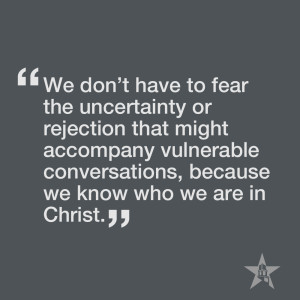There must be a switch that’s flipped between junior and senior year. As of late, more and more of the conversations I have drift toward, “What are you going to do after you graduate?” Often, my reply amounts to well-intentioned rambling about dreams and ideas and few definite plans about the future. While most of these questions come from the genuine curiosity and care of friends and relatives, I think they also get at something deeper. Beneath the five-year plans and polished resumes lie our responses to one of our culture’s favorite expectations: You’ve got to have it all together.
 Now, don’t get the wrong idea. Resumes and networks are powerful tools that can be key in thinking about our professional journeys. Post-collegiate plans, however, are just one way this expectation shows up in our culture. It has permeated the church, too. We see it in the perfectly filtered photos of Bibles alongside coffee mugs and conversations that often fail to go beyond surface level. In adopting the belief that “we’ve got to have it all together,” we as Christians have forgotten the value of vulnerability.
Now, don’t get the wrong idea. Resumes and networks are powerful tools that can be key in thinking about our professional journeys. Post-collegiate plans, however, are just one way this expectation shows up in our culture. It has permeated the church, too. We see it in the perfectly filtered photos of Bibles alongside coffee mugs and conversations that often fail to go beyond surface level. In adopting the belief that “we’ve got to have it all together,” we as Christians have forgotten the value of vulnerability.
Social scientist Brené Brown defines vulnerability as “uncertainty, risk, and emotional exposure.” Vulnerability asks us to be authentic. When we pursue vulnerability, we put away the person we think we need to be and move instead toward authenticity. It requires us to be honest about our experiences, feelings, and at times, shortcomings. Being vulnerable means stepping outside of our comfort zones, putting away our pre-packaged answers, and putting ourselves out there.
To be honest, pursuing vulnerability sounds challenging, and even frightening. By its very nature, though, the church ought to be one of the safest places to be vulnerable. When we say we believe in Christianity, we recognize we are in no way close to having it all together. The very heart of the Gospel message tells us that it is only through the power of Jesus’ death and resurrection we find restoration. Knowing this, we can let go of who we think we should be or who our culture tells us we ought to be. We don’t have to fear the uncertainty or rejection that might accompany vulnerable conversations, because we know who we are in Christ.
 Admittedly, vulnerability can be abused. Just as we run from vulnerability in an effort to look like “better” Christians, we can misuse it in order to feign humility and appear more spiritual. These motivations miss the mark. At its best, vulnerability isn’t about us. Rather, it’s a tool we can use to connect with others. Sharing allows us to build trust, be heard, know that we are loved, and remember we’re not alone. Opening ourselves up to others creates a more comfortable environment for others to share as well. And in allowing people to do so, we learn how to listen and support those around us more effectively. Even looking outside of the Church, our stories can be powerful testimonies to God’s faithfulness and goodness. As Christians, a posture of vulnerability says, “I don’t have it all together. In weakness, we find strength, because Christ makes all things—including you and me—new.”
Admittedly, vulnerability can be abused. Just as we run from vulnerability in an effort to look like “better” Christians, we can misuse it in order to feign humility and appear more spiritual. These motivations miss the mark. At its best, vulnerability isn’t about us. Rather, it’s a tool we can use to connect with others. Sharing allows us to build trust, be heard, know that we are loved, and remember we’re not alone. Opening ourselves up to others creates a more comfortable environment for others to share as well. And in allowing people to do so, we learn how to listen and support those around us more effectively. Even looking outside of the Church, our stories can be powerful testimonies to God’s faithfulness and goodness. As Christians, a posture of vulnerability says, “I don’t have it all together. In weakness, we find strength, because Christ makes all things—including you and me—new.”
My hope is this: That we would remember that the Christian life is not akin to a list of items that we must check off or a presentation that we would give at work. Rather, it’s an ongoing, and sometimes messy, process of learning what it means to look more like Christ and to love God and others. Because our identity is in Christ, we have the freedom to boldly pursue vulnerability. Henri Nouwen sums it up well, saying, “We are called to be fruitful –not successful, not productive, not accomplished. Success comes from strength, stress, and human effort. Fruitfulness comes from vulnerability and the admission of our own weakness.”

2 replies on “Pursuing Vulnerability as Christians”
This young servant of the Lord has certainly hit the mark. So many times we feel the need to be strong and put on a face for others. But that isn’t what God calls us to. He calls us to relationship–relationship with Him and with others. Unless we are willing to trust Him and to be vulnerable we can’t be His light here on earth. Thanks, Em, for reminding us that it’s about Him and not us.
Wonderfully written!!! What has been expressed applies to many more than just young men & women, giving us a reason to look within.